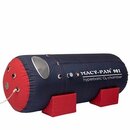AfterDark
Contributor
Unfortunately, some of those things are a "one step forward, two steps back" type of thing. Specifically, the availability of hyperbaric chambers to treat dive injuries has been declining for several years now. The Disappearing Recompression Chamber: Undercurrent 09/2013
We need more community funded chambers like Catalina.
OR check out this bad boy:
 Look close it's inflatable, the wrinkles appear where the red caps meet the body. A set of tables and your in business!
Look close it's inflatable, the wrinkles appear where the red caps meet the body. A set of tables and your in business!
Last edited:




 True too for the 80's (YMCA, can't comment on others). At least that was my experience....
True too for the 80's (YMCA, can't comment on others). At least that was my experience....